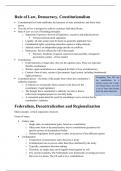Rule of Law, Democracy, Constitutionalism
Constitutional law both establishes the functions of state institutions, and limits their
power
The rule of law is designed to achieve or protect individual liberty.
Rule of Law as a set of founding principles:
o Separation of powers: division of legislative, executive and judicial powers
Vertical and horizontal separation
o Legality: all state action must be based on generally applicable laws
o Fundamental rights: protecting minorities against a ruling majority
o Judicial control: an independent judge decides on conflicts
o Democracy: the law reflects the will of the people
Elections, freedoms of speech, expression and assembly, transparent
government, parties - all are needed
Constitutions
o In the hierarchy of legal rules, they are the supreme ones. There are rigid and
flexible constitutions.
o Written, rigid constitutions as a safeguard for Rule of Law and democracy
o Content: form of state, system of government, legal system, including fundamental
rights protection
Exception: The UK has
Constituent power – the body of the people from whom the constitution’s
no constitution in a
authority emanates. narrow sense, but it does
o A reference to real people whose consent is the basis for the in a broad sense, as it has
constitution’s legal legitimacy a set of laws that dictate
o The thought that a constitution’s authority can derive from a how the state functions.
collectively imagined project no one fully holds
o A conceptual point about the need for something to serve as basis for the
constitution’s authority
Federalism, Decentralization and Regionalization
Main concepts: vertical separation of powers
Forms of states:
Unitary state
o Single state, no autonomous parts, based on a constitution
o Often some form of decentralization, but no constitutional guarantees for
specific powers of decentralized bodies
o National legislature freely grants or takes away power of the different regions
Confederation
o Cooperation of autonomous states based on a treaty
o Confederation has no powers other than those attributed by the treaty
o Typically, unanimous decision making
o Therefore, no single state can be legally bound against its will
o Few current examples, The Netherlands were historically sovereign provinces
that were in a union. The US used to be a confederation.
, Federation
o Based on a constitution
o One state with relatively autonomous parts
o Constitution contains clear division of powers between federal and state level,
usually lists of exclusive powers
o The powers of the subunits that make up the federation are defined in the
constitution
o States are represented in the federal parliament
o Constitutional court decides on conflicts
Regionalization
o A unitary state that grants a certain amount of autonomy to regional authorities
o No constitutionally protected autonomy for subunits
o Uses quasi-federal mechanisms, but not in the form of a full federation
o Examples: UK, Italy
Reasons for federalism, decentralization, regionalization
Decentralization (or devolution)
o Limited local autonomy within a national union, the central government
doesn’t lose control, still strongly centralized
Federalism
o Uniting policies that are culturally / economically / etc. different for size
benefits: economic or military strength
o Effectively governing large territories with a common culture and language
Regionalization
o Strong but limited local autonomy, constitutional recognition of regional
differences
Note: Popular vs monarch vs national vs state vs parliamentary sovereignty
Enumerated powers – powers that are granted in the constitution
Residual powers – something that is not listed in the constitution
Country case studies:
Spain
o Unitary, but contains federal elements.
o Article II of Spain Constitution: “Constitution is based on the indissoluble
unity of the Spanish nation… recognizes and guarantees the right to autonomy
of the nationalities and regions”
o Article 147 divides powers among the “Autonomous Communities,” such as
organization of institutions and self-government
o Article 155 states that if a region fails to meet its obligations imposed by the
Constitution or for the interests of Spain as a whole, the national government
may intervene. (Catalonia)
South Africa
o On paper a federal state, but the National Legislature has a lot more power than
the provinces
, Solving major national problems becomes easier when done on a
national rather than a provincial level





